The Pandemic Made the CPS Class of 2021 Double Down and Remain Focused
The pandemic was remembered at the College of Professional Studies’ master’s degree graduation ceremony on Friday as a unifying force that bred a kind of resilience and flexibility that allowed students to bend, but not break, under the pressure of a global health crisis.
“I Know He Would be So Proud” – Scholarship Donors Connect with Students
Written by Stephanie Krzyzewski
“Always, always be grateful to those who helped you.” These are the closing words of Marisa Lemus-Reynoso (Biotechnology, Class of 2023) as she addressed a crowded Raytheon Amphitheater at the annual College of Professional Studies undergraduate scholarship reception on the evening of August 19, 2021 on Northeastern’s Boston campus.
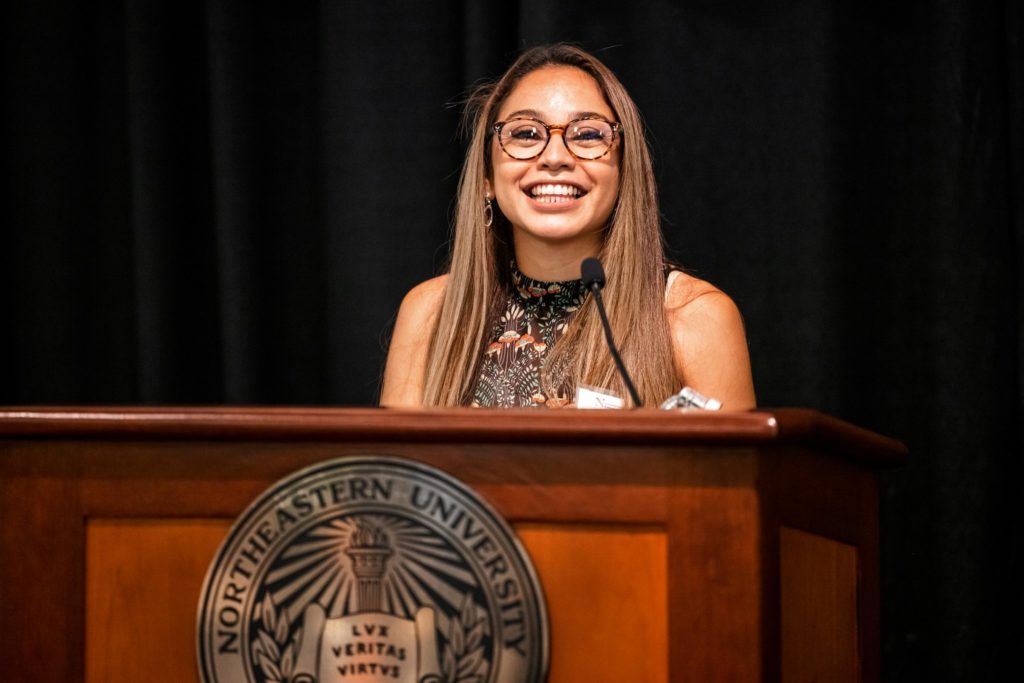
Marissa has good reason to be thankful, as do the dozens of other students in the room. A few weeks ago, they received the news that they would be receiving additional financial aid for the 2021-2022 academic year thanks to philanthropic contributions made by alumni and friends of Northeastern.
The College of Professional Studies has more than 50 scholarship funds established and supported through philanthropy throughout the past 40 years. For the upcoming academic year, this translates to approximately $400,000 in scholarship funding being awarded to more than 200 undergraduate students. Each summer the College hosts an event on campus to celebrate scholarship recipients and recognize their generous benefactors.
Marissa Lemus-Reynoso is receiving two scholarship this year – the Charles E. and Gail A. Evirs, Jr. Scholarship and the David R. Johnson Memorial Scholarship – and her benefactors were in the room on August 19 to hear her personal story and support her academic journey.
Nancy Johnson, who spoke just before Marissa, established the David R. Johnson Memorial Scholarship in memory of her late husband in 2019 along with her sister and brother-in-law, Joan and Pete Johnson. Dave, who earned his business degree from Northeastern in 1976, passed away in June 2018, and establishing the scholarship was a way for his family to find solace in his loss.
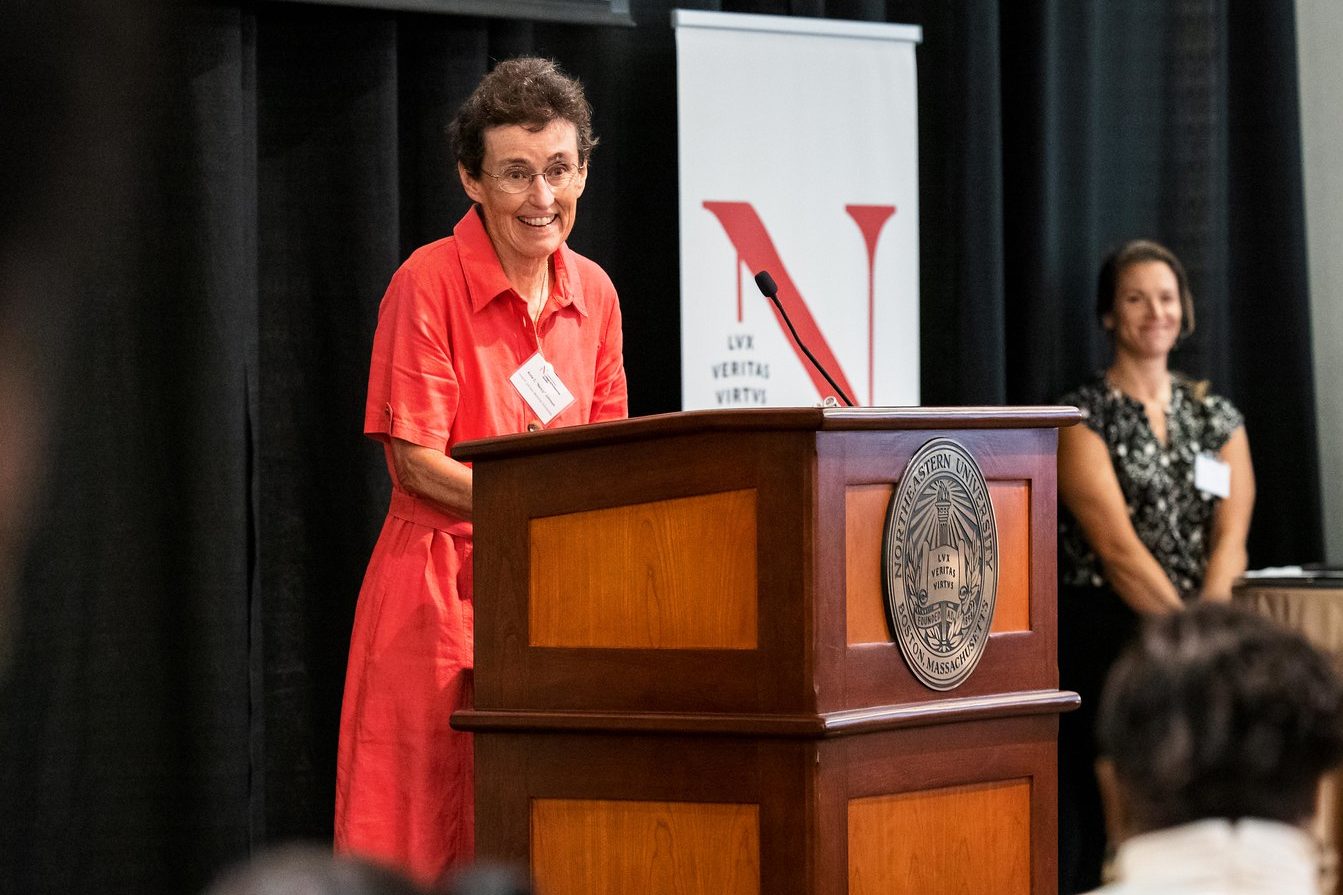
It was a special moment when Nancy introduced Marissa and invited her to take the stage, giving her an elbow-bump by way of welcome. Nancy had just finished sharing the story of Dave’s academic and professional journey, and you could hear her voice crack with emotion as she said, “Receiving this scholarship means Marissa’s life will forever be connected to Dave’s legacy, and I know he would be so proud of her if he’d had the chance to meet her.”
That sentiment is a tidy way to describe the purpose of this annual event – celebrating the impact of scholarships and the ability they have to transform lives and to foster lifelong connections among the Northeastern community.
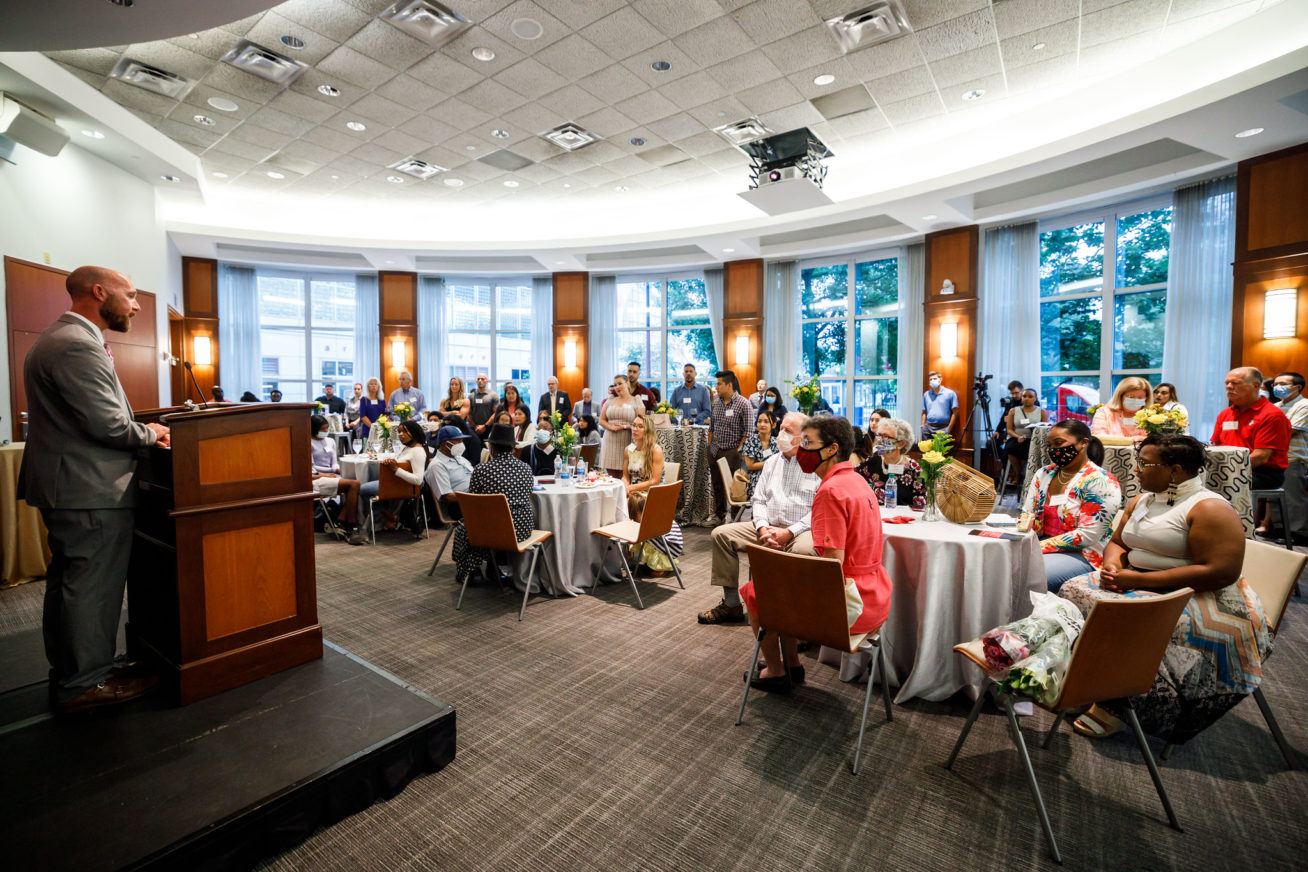
College of Professional Studies Undergraduate Scholarship Program
Learn more about undergraduate scholarships at the College of Professional Studies and view photos and video from the 2021 annual reception event.
If you have any questions about the undergraduate scholarship program at the College of Professional Studies, please contact Stephanie Krzyzewski, Director of Strategic Partnerships and Funds, at [email protected].
Data Analyst Trey Williams Values the Firm Foundation Built at Northeastern
Intention, persistence, and perspective. These are some of the themes that rise to the surface when talking with 29-year-old Trey Williams about his Northeastern experience. But looking back, he will be the first to admit that this level of maturity took time to develop.
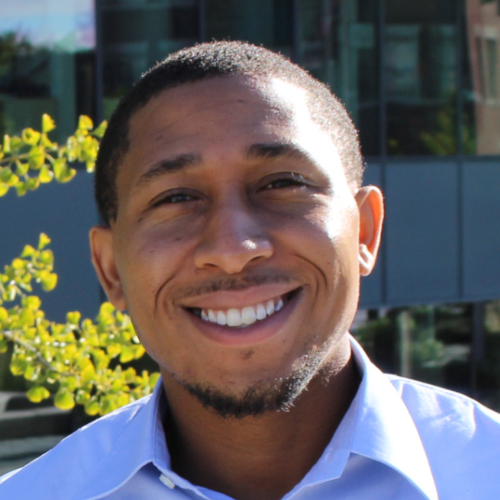
Trey graduated from New Mission High School in Boston’s Mission Hill neighborhood in 2010, and although he took mostly advanced level classes and had college aspirations, he hadn’t applied himself seriously enough to get accepted anywhere. When he heard about Northeastern’s Foundation Year program through a local youth support organization, he knew he’d found himself a pathway to a college degree; but his first year of college was a rocky start, and he almost didn’t make it through the first semester. “I was a kid. It was the first time I had responsibility, and I didn’t know how to manage that freedom properly. I wasn’t asking the right questions and didn’t know who to talk to, and at first I was just in it for the piece of paper at the end.”
With thoughtful guidance from the Foundation Year faculty and advisors, Trey finished the year on the Dean’s List and matriculated into the College of Professional Studies—starting as a Biology major before transitioning to Psychology, and eventually settling on Management. Like many students in the College of Professional Studies, he had to work full-time to finance his education as he went. As he neared the completion of his degree, the financial burden became too high, leading him to quit taking classes. “In 2015, I ran out of financial aid, and that’s when it hit me that life is real and you have to be very intentional about the choices you make. Losing financial assistance, not being able to graduate, watching friends and family members graduate around the same time. That really hit me hard.”
After working for several years in hospitality, Trey found himself at a crossroads. “As you rise through the ranks in your career as a person of color, you start to see less and less people who look like you, and it can be hard to gain favor. Over a four-year time-frame, I worked my way up to a Director level, but still no one took me seriously, because I didn’t have a bachelor’s degree.” With the perspective he had gained over his years in the workforce, Trey knew he wanted to become a financial analyst, eventually pursue a PhD, and become an economist. But the first step was to complete his undergraduate degree.
“As a person in my early 20’s, paying for my education cost my entire life savings. I had slowly been saving over time, and I realized I could either use that money to invest in my education or keep working service industry jobs that would end up working me to death. And I figured that by the time I was 40 I would probably want to still be able to stand.”
Trey graduated with a degree in Management from the College of Professional Studies in 2019. He recalls, “Some of my friends didn’t end up graduating because even after finishing Foundation Year, they still experienced financial barriers they couldn’t overcome towards finishing. For me, it took 9 years.” Even after completing his degree and pursuing several certifications in financial modeling and analytics, he had trouble finding a job as an analyst. “I had to be in the workforce for a little while to realize that just because you have a piece of paper doesn’t mean you’re any more qualified than the person standing next to you. I needed to be ahead of the crowd on the cutting edge. I needed to be at home doing research in my free time. And I realized I would also need a master’s degree.”
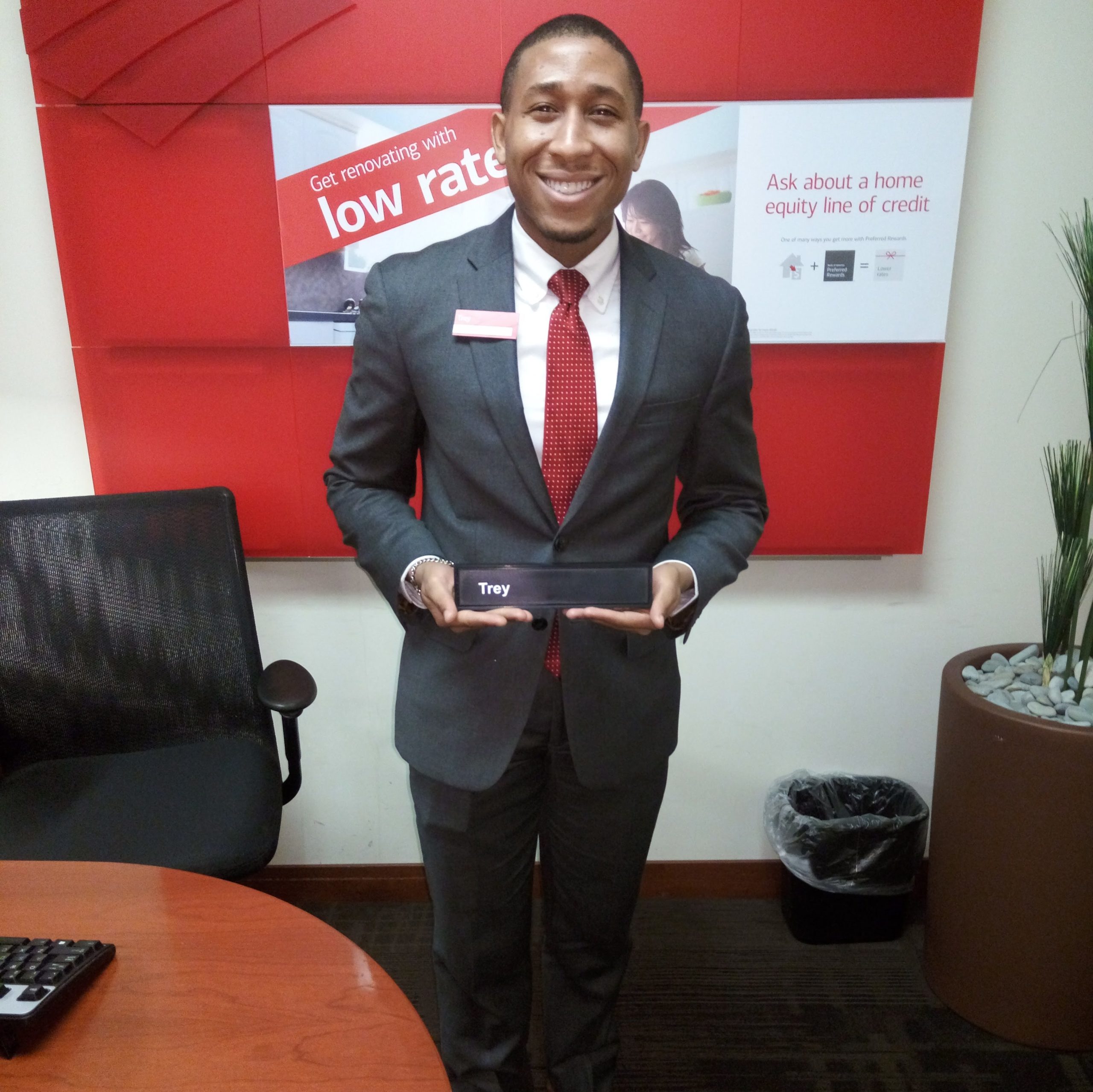
By this time, Trey had gained perspective through life experience and had created a set of intentions and goals which he planned to achieve by investing in his education. But persistence always came naturally. “I lost a friend when I was young and knew I wanted to get my family out of the neighborhood we lived in. I lost my mother at 21 and wanted to help my grandmother. I wanted to be an example for my younger brother. I wanted to begin to establish generational wealth for my family. I knew as long as I applied myself and worked my connections, I’d get there.” Trey completed his master’s in analytics in July 2021, started a data analytics consulting company, and accepted a data science fellowship with The Data Incubator, an immersive training program designed to fine tune the skills necessary to become a leader in the data science field.
Having made measurable strides toward his goals, Trey has had time to step back, reflect, and begin to pay it forward. In 2020 he joined Northeastern’s Young Alumni Advisory Board as Chief Executive Connector. “I’d like to mentor current students to help them understand why they’re in school, how they can apply their skills and education to work in the world, and how to work their interests and passions into their course of study. I want students to have a more active role in engaging with project and academic work than I did as an undergrad.”
He has also had the opportunity to consider his personal journey from the very beginning, starting with Foundation Year. “The Foundation Year faculty are amazing, they give 110%. I see the value that they brought to my life with extra support and hand holding, because I was not prepared to be in a college environment, and if I had gone straight into the standard Northeastern experience, I don’t think I would have been able to survive let alone perform at a level that was exceptional. They were able to give me the space and feedback necessary to grow. Foundation Year is everything. It really is the foundation.”
Foundation Year is an innovative, first-year college program at Northeastern University College of Professional Studies that provides students from Boston with rigorous academics integrated with student support services to create an environment where students can be successful for their entire Northeastern college experience. Learn more about Foundation Year.
Learn more about our programs
Webinar Replay: Using Sports to Learn Analytics and Data Driven Decision Making
This webinar engaged practitioners in a discussion on the use of sports to learn analytics. Participants walked away with a better understanding of how analytics informs decision making in the business of sports. The event was facilitated by Northeastern’s Robert Prior, EdD, lead faculty for the Master of Sports Leadership program, who was joined by Jonathan Hay, vice president of data, intelligence & analytics for the Boston Red Sox, and Dave Schrader, sports analytics educator and board member of Teradata University Network.
Northeastern’s Master of Sports Leadership now offers a concentration in Analytics.
CPS Announces Experiential Learning Award Winners
The Experiential Learning Awards are a recognition opportunity for students within the College of Professional Studies. They are awarded to students who have successfully integrated the classroom with real world projects, going above and beyond in their educational journeys. Our programs engage students with the world through professional work, research, and service on seven continents. They learn how to transform ideas into impact and become global citizens with successful careers.
Each year we recognize outstanding students who demonstrate great skills while on Co-op, through XN projects or sponsorship, through the Experiential Learning Awards. We hear nominations of highly accomplished students about what they were able to accomplish through our experiential opportunities. The students selected for these awards are nominated by their Co-op employers, XN Project Sponsors, Faculty or staff. The awards are broken down into three main categories: Co-op Excellence, XN Excellence, and Humanics.
Cooperative Excellence Award Winners
This award is for students who have demonstrated dedication and success in improving their organization through their workplace contributions and experiential learning.
Chi Doan
BS Management
“Chi Doan is a student who epitomizes Northeastern University’s goal of preparing students for. Chi is an international F1 student who started her academic journey in the College of Professional Studies in the Fall of 2018. She is a BS-Management candidate who will graduate in May 2021. Chi’s focus on her academic and professional development is unlike any student I have worked with as both an Academic Advisor and Adjunct Instructor. Academically, she has maintained a GPA of 3.986 with one course remaining. Professionally, she has sought out opportunities to obtain experiential learning activities that made her a highly sought after candidate.
Initially, Chi prepared herself by taking the XN prep course, INT2000 in the Spring of 2019. I had firsthand knowledge of her work in this course since we often met to discuss her resume and professional development goals. In CPS’ Academic Advising Office in the Fall of 2019, I leveraged a number of Chi’s marketing skills and self-sponsored an 8-week XN Project (INT2001) that helped me streamline communications to a cohort of international students. In the Spring of 2020, Chi obtained a 6-month, full-time Co-op (COP3945) at Wayfair as a Marketing Analyst where she led app marketing and email optimization campaigns. While initially on-site, Chi successfully transitioned to remote work when the global pandemic hit. In the Fall of 2020, she took on a part-time Co-op (COP3944) at LogRhythm where she executed webinar promotional campaigns. Also in the Fall of 2020, Chi enrolled in a 3-credit Experiential Management Practicum (MGT4995) and worked with a local non-profit, ThinkGive. Under Chi’s leadership, her team received the client’s highest accolades. I was the Instructor for this course and can also attest to the quality of Chi’s outputs.
It is with utmost pleasure that I submit Chi Doan for Northeastern University’s Experiential Learning Award. She has been the steward of her professional development and is a shining example of experiential learning in action. Please do not hesitate to reach out to me if I can provide any additional information in support of my recommendation.” – Mark Almeida
Rohan Pappu
MPS Analytics
“Rohan interned at our project, Our Youth Social Community which manufactures and distributes Organic(100%) pads to rural women in India (3.5 lakh pads per month). He handled 4 teams of Indian Institute of Management, MBA students in our Organisation. Total group he organised was 4 and our project is about menstruation(Project Suraksha). Rohan helped all these 4 groups in researching the information or data regarding the napkins and menstruation. That led us to be on a successful path. Now our project is helpful for more than 42,00,000 girls in India. It’s not only increased our organisation’s reputation but also helpful for so many young girls in India (>42,00,000). He is a stronger team leader, and an even greater human being! Many Thanks to Rohan!” – Sohan Pappu
XN Excellence Award Winners
Experiential Network (XN) helps Northeastern University students work in their respective fields while working with different sponsors on a wide array of projects. The XN Experiential Awards celebrated a student who excelled in their XN curricular course project by applying knowledge gained in their academic program through the integration of key theoretical elements and related practical experiences.
Victoria Moore
Doctor of Education
“I would like to congratulate Victoria Moore for her achievements in extending experiential learning opportunities to children and faculty by establishing a community school in Zimbabwe. Wildwoods School, https://www.wildwoodsinternational.com/, champions a student-centered vision, as evidenced by the statement, “We believe in holistic education that commits to developing the whole child, inspiring our scholars to be global leaders advocating for our environment, community and beyond within a sustainable school environment, embodies experiential learning for the youngest of learners. When I first met Victoria, she engaged in an action research project through her coursework to make this vision a reality. Designing with students and families at the center, she began with a home preschool and has just realized her dream of opening an elementary school designed to provide the children of her community with access to high-quality, accessible education designed for positive global impact. Over the past two courses, I have witnessed an entrepreneurial educator’s grit, perseverance, and leadership. Victoria faced numerous barriers and challenges to making her vision come to life. With the encouragement of her community, she persevered. Wildwoods is just in its early stages, and Victoria understands the significance of teacher efficacy in making the experience successful for the students. As a part of the experiential learning course, she has designed a professional learning model built on the tenets of experiential learning so that her faculty has the tools and skills needed to deliver education through an experiential learning model.” – Paula Dillon
Watch Victoria’s nomination video
Vanessa Leyva
MS Project Management
“Vanessa participated in the XN project with BreastFeedLA. BreastFeedLA is a non profit advocacy group based in Los Angeles that was seeking assistance from Northeastern for a Marketing Plan to promote their breastfeeding courses. BreastFeedLA was looking to outreach to potential students who represented the ethnic and cultural diversity of LA County in order to promote breastfeeding to a wide range of communities. Vanessa and her team developed user personas based on feedback from the XN sponsor. These personas formed the basis of the marketing strategies for the entire course. Vanessa spearheaded the idea of user personas, identified people to interview so that they could capture intentions, requirements and sentiments. Vanessa’s approach is a clear example of leveraging a methodology taught in the PJM courses with a practical application such as a non profit’s marketing strategy. By using personas, identifying actual people to interview, Vanessa was able to create authentic profiles that BreastFeedLA can refer to in the future. Vanessa’s approach sets a template that the organization can re-use in any subsequent Marketing efforts. Vanessa’s creativity and proactive approach in this XN project represents Northeastern students at their finest. I recommend Vanessa without hesitation. ” – Mimi Wan
Humanics Award Winners
Humanics is specifically the integration of technical literacy, data literacy, and human literacy. This award celebrates and highlights a student who exhibits and demonstrates Humanics, contributes significantly to the understanding of the universe, and practices lifelong learning by combining technical, data, and interpersonal skills throughout their Northeastern career and within their respective communities.
Rachael Elliott
Master of Education
“Rachael worked tirelessly to develop a self-designed and scoped multi-component project, with both immediate and long-term utility, to address a current problem of practice she identified. Her intense commitment to this project was striking, as is her final work: – A fully developed and Creative Commons Licensed repository – The International Student Support Repository (ISSR). It can be accessed at www.internationalstudentsupport.org – A sample conference presentation (voice narrated) that demonstrates how she will introduce this project to the international education community. The presentation is titled “Harnessing Open Educational Resources for Faculty, Staff, and Community Training: A Pathway to Improving International Student Outcomes.” (Available on request.) – A virtual tour of the ISSR (which can also be found on the main page of the website): https://sites.google.com/view/international-student-outcomes/video-tour?authuser=0 Rachael shared, in the end, “This will never be complete or finished!” She got very, very deep into this work and is committed to lifelong learning and service. She added, “I’d love to be a sponsor/mentor for a future student who is engaging in something similar. I am so grateful I was able to work with Jaime, and hope I’m able to support someone just as fully in in the future.” Like Jaime, Rachael is committed to serving and supporting future NEU M.Ed. students in their XN experiences.” – Joan Burkhardt, Professor
Dandi Zheng
MS Commerce & Economic Development
“Dandi was so passionate about applying her mathematical modeling and statistical techniques to addressing an interesting and timely question. Along with another team member, she looked into the video streaming industry that became much more popular in the COVID-19 era. Specifically, she assessed the operational performance of video streaming firms (e.g., Netflix and Disney+) and examined the relationship between their performance scores and stock prices. To that end, she combined nonparametric analysis with parametric analysis. Her project was not only methodologically rigorous but also practically intriguing to investors and industry experts. She committed a lot of time to the project and I believe she is a strong candidate for the award.” – Youngbok Ryu
Watch Dandi’s nomination video
Congratulations to all of this year’s Experiential Learning Award winners!
Solution Seeker
Sagar Ashok Daswani (CPS ’20) uses big data to help companies and communities thrive.
“I’ve always been interested in solving problems,” says Sagar. “I especially like business problems. My family liked to talk in numbers.”
In his pre-teen years, Daswani, whose family is in the clothing business, could often be found with a Rubik’s Cube in his hands. In high school in Gujarat, India, he took a coding class, got excited about algorithms, and built his own Sudoku game. In his first year as an undergraduate at Dharamsinh Desai University in Nadiad, India, he learned how to build cloud-hosted websites. Then he noticed that students in the small town where he lived were having trouble accessing books, electronics, lab supplies and other educational materials they needed for school. So, as a sophomore studying computer science, he launched malgadi.co.in, a nonprofit designed to make it easier for students to get such items. With word-of-mouth buzz and a logo depicting a speeding delivery truck trailing Hot Wheels-style flames, the idea soon took off.
“A couple of friends and I saw a problem and said, ‘there needs to be a solution,’” Daswani says. “We programmed it from end to end, building a proper e-commerce website. We managed inventory and projects, and we hired students. Now, people can get these things delivered to their doorstep.”
The experience, Daswani says, was instructive.
“We wanted the thrill of entrepreneurship, and to see how big and small companies put it together and build a great product,” he says. “We converted the startup into a student-entrepreneurs organization, and we recruited students from the junior class. Then we expanded to other colleges. It’s a way for students to learn entrepreneurial skills—soft skills, business strategies, how to handle credit. We had applied what we learned at school to a practical problem.”
The following year, as a senior, Daswani again applied the tools he had gained in an academic setting to generate a business solution. As a software engineering intern at the Indian Space Research Organisation—the Indian equivalent of NASA—he used the Java programming language to engineer a “Monte Carlo” simulation to predict the effect of high-energy solar winds on the functioning and survival of a “sand detection box” inside the planetary-surface exploration devices known as rovers.
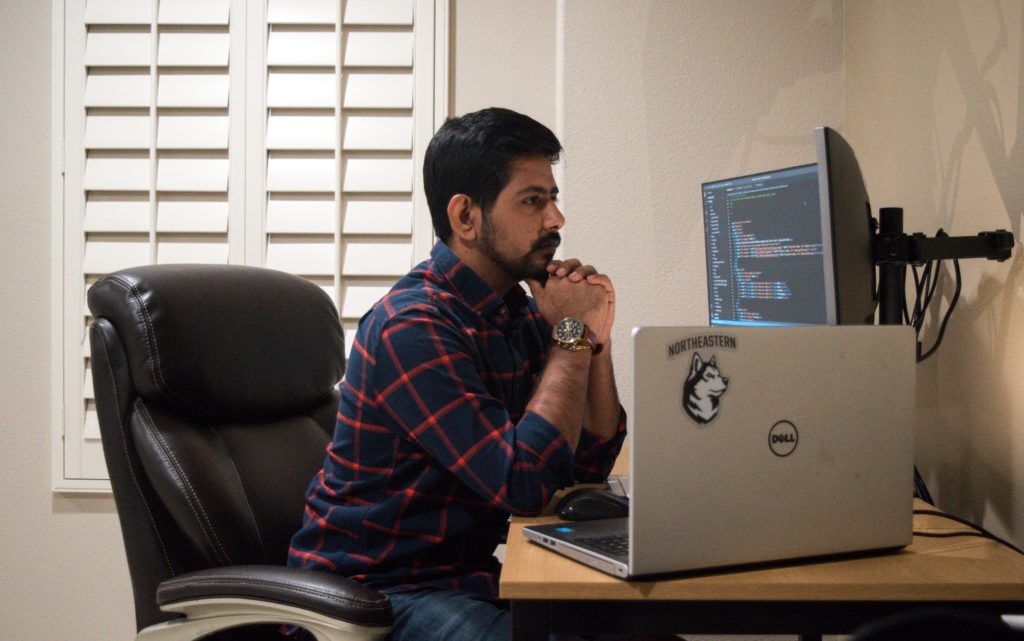
“To increase a rover’s lifespan,” Daswani says, “we integrate different materials—gold, copper, aluminum, sand, other things. Then you bombard it with high energy particles to see what will happen: Will the particles get inside? Will they destroy the circuit? To carry that out in real time is very, very expensive. So, I created a simulation, and it reduced the cost by a lot, and they’re going to be using it. It was a fun experience.”
With a bachelor’s degree in hand and several big problem-solving successes under his belt, Daswani’s next goal was to find a graduate school that would support his passion. A cousin who was attending Northeastern suggested he explore the programs at the College of Professional Studies, and when Daswani heard about Northeastern’s commitment to experiential learning, he was instantly intrigued.
“My cousin told me about how, at Northeastern, you get to interact with real-world business problems to help an organization,” Daswani says, “and how there are learning problems you can get your hands onto. I’ve always been interested in practical approaches—not research so much, but business problems. I started at Northeastern right after I finished my undergrad.”
At Northeastern, Daswani says, he decided he wanted to learn more about bridging the gap between technical and business users of technology, and he designed his program of study accordingly. He took courses on the foundations and applications of AI, intermediate and predictive analytics, and data visualization—anything that he thought might help him learn about the practical applications of big data. He participated in no less than four real-world projects, building his skills by helping a medical device company optimize its freight system, digitizing historical documents for a nonprofit, using big data to assess startup survival for a crowdfunding company, and working with a blockchain and healthcare company to provide solutions for their client physicians.
He also started to make connections.
“One of the great things that happened at Northeastern,” Daswani says, “is that I was introduced to so many different professors—not only in the College of Professional Studies, but across the University.”
That, he says, stood him in good stead when he and other students wanted to start a campus organization to encourage and support the exploration of artificial intelligence and machine learning. The result, AI Skunkworks at Northeastern University, came about through a collaboration among students and faculty. On its website, the organization describes itself as “a group of people who research and develop Artificial Intelligence, Machine Learning, and Deep Learning projects primarily for the sake of innovation and learning.” With the support of the University, the group provides members (who playfully refer to themselves as “skunks”) with open-mics, mentorship opportunities, workshops, seminars, hack-a-thons, and other events exploring the implications and potential of artificial intelligence, machine learning, and Deep Learning, a subset of machine learning that involves artificial neural networks driven by algorithms and is a special interest of Daswani’s.
“I delivered a workshop myself on neural networks and concepts of deep learning,” he says. “That was an opportunity to bring my expertise and share it with other students and help them learn more about it.”
He also organized a NASA space hackathon and, in the course of these and other projects, Daswani’s leadership skills and commitment to the Northeastern community earned him a nomination for Outstanding Graduate Student.
Those qualities—and his technical abilities—have not gone unrecognized in the wider world. Soon after graduating from the College of Professional Studies with a master’s degree in Analytics, Daswani applied for and landed a job as a junior software engineer and data scientist with Lattice Automation, a Boston startup that designs customized software for companies involved in synthetic biology.
“Our work at Lattice,” Daswani says, “is to build lab-automation software that helps scientists make the best use of data, so they can track performance and see what’s going on inside the lab. My role is to help build dashboards to provide the best possible interactive environment for biotech companies—it’s software for data scientists.”
The experiential learning model that he had encountered at the College of Professional Studies, Daswani says, is what prepared him for the job.
“I got exposure to this kind of work through my capstone project at Northeastern, where I built a website that lets users visualize how a startup is performing and evaluate the chances of its survival, based on patterns in the historical data. This particular job also demanded that expertise, and I had experience working on a real project in the capstone. They liked that.”
The opportunity to participate in that kind of hands-on learning, Daswani says, is what led him to Northeastern in the first place. But he was also impressed by the diversity of the community he found there.
“I got a chance to work with people from many different backgrounds and cultures,” Daswani says. “In every company in the U.S. right now, there are people from different places, and it’s a great start to be interacting with different people to get to know more about their side of the story, their perspective. Being able to look at the bigger picture helps with any kind of work.”
So, what’s next for Daswani?
“I’m still new in this professional world,” he says, “so I’m not sure yet. But eventually I think I’d like to start my own company, where I can leverage AI, solve business problems, and bring value to the community. I’ve always been curious to implement what I learn academically in real time, to see how it can actually help to make change for a company—or in the world.”
Meet Archie, Data Scientist
Hear from Archie Jain ’19 about how the Master’s in Analytics program combined industry insight from faculty working in the field with core knowledge.
The Intersection of AI and Talent Strategy: What Employers Need to Know
The world we are living in is quite different from two years ago when the College of Professional Studies at Northeastern University held its symposium, The Intersection of AI and Talent Strategy.
Digital transformation is happening at the speed of light, creating opportunities as well as uncertainties, and COVID-19 has only further transformed how individuals and organizations interact in the networks we are building.
The conference organizers recently went back to some of the symposium participants to ask how AI and talent strategy has changed 18 months later and how COVID-19 affects what they are doing in their organizations today.
Always Growing
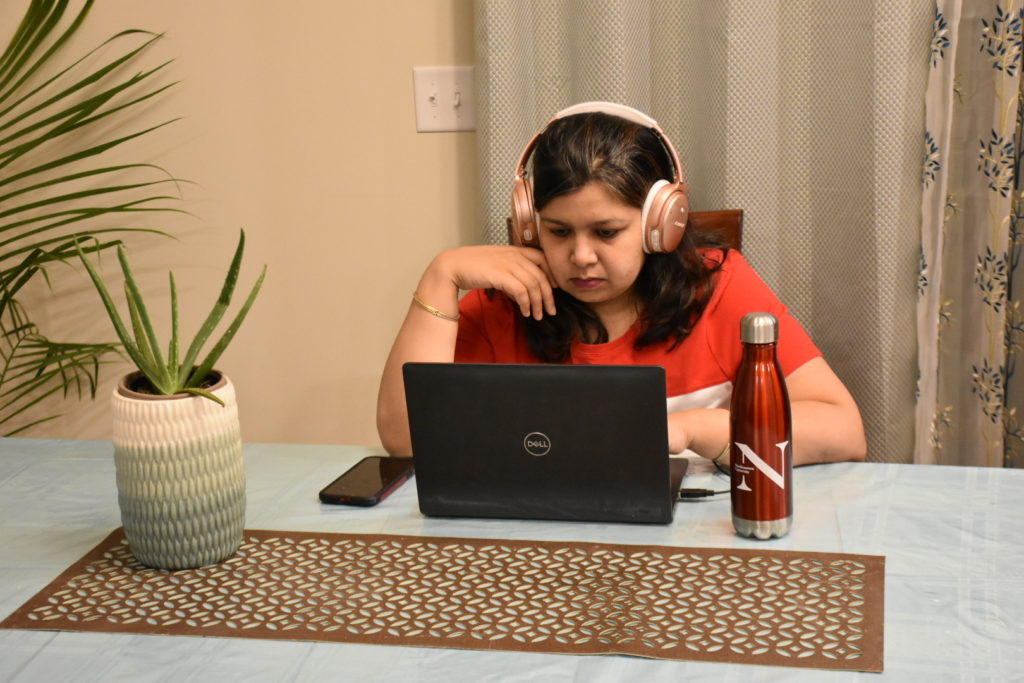
Smita Gupta has a passion for analytics.
“These technologies are always growing,” she says. “They’re never stagnant. You can always get updated with new tools and learn how to create something new.”
Gupta’s skill in analytics dovetails nicely with a related interest—collaborating with colleagues and helping businesses succeed.
“In the field of analytics,” she says, “I’m able to interact with people in roles from the top-most positions to the most entry-level—whoever there is in your company. So I meet all kinds of people, and that also keeps me engaged in working with these technologies.”
Gupta’s interest in information technology (IT) started at the Indira Gandhi Institute of Technology in New Delhi, India, where, in 2005, she earned a bachelor’s degree in technology, electronics and communications. Her first job was as a software engineer at the multinational professional-services company Accenture. It was there, she says, that she first developed an interest in data analysis and SQL. She went on to several jobs in data management in India before moving to North Carolina in 2015, where she worked first as a consultant and then as a systems analyst at software company Cotiviti Inc. She enjoyed the work, she says, but also yearned to be closer to the cutting edge in her field.
“I liked the work I was doing with data,” Gupta says, “but these new technologies were appearing, and I was interested in predictive modeling and visualization, and I wasn’t getting to work with it in the roles that I had. So, I thought returning to school might be a good option—to get a broader overview and learn more. I wanted to be able to utilize new technologies and possibly enhance my career.”
With that in mind, Gupta began the search for a master’s program with advanced analytics courses. She and her husband had recently moved to Massachusetts, and after looking at several universities online, she found the Master’s in Analytics program at Northeastern’s College of Professional Studies. She read through the curriculum and realized that it covered exactly the blend of topics and technologies she was looking for, including predictive analytics, artificial intelligence and the programming languages Tableau, Python, and R.
“What was most interesting to me,” Gupta says, “was learning about the experiential and capstone courses that could help me apply the principles and tools of analytics to real-world problems or projects within a sponsoring organization.”
Despite her excitement, returning to school after working in the professional world for a decade was also a daunting prospect. She had an established career, her daughter had just turned 6, and she and her husband were planning to have another child.
“I was scared and anxious,” Gupta says. “And I was thinking: How will I adapt to a new culture, going to school after those 10 years? All the students will be so much younger than me. And maybe the professors will be my age!”
Her husband’s support, the program’s flexibility, and the support she received from faculty and fellow students soon laid her fears to rest. She also found that, despite her worries, her professional experience made her a natural fit for leadership roles in projects and discussions.
“In my previous organization, in addition to performing analytical operations, I was also the technical leader and managed some of the teams,” Gupta says. “So, I had some experience coordinating the team and assigning tasks.”
Those skills were particularly useful, she says, when it came to the hands-on projects her classes required—projects she calls highlights of her educational journey at Northeastern. Gupta participated in both an experiential learning project—analyzing data and creating dashboards for Viacom, a leading worldwide media company—and a capstone project in which she and her team developed predictive models for a multinational footwear and apparel company.
“I learned so much in those two programs,” Gupta says, “both in terms of how data should be analyzed and the variety of techniques with which it can be presented to a target audience. The procedures we learned for generating insight were very helpful. With the support and advice of our professors, Dr. Nathaniel Lin and Dr. Alice Mello, we were able to successfully complete the projects.”
It was especially satisfying, she says, to learn that the companies had accepted the dashboards the class had created and would be implementing them in the real world.
“Our presentations went well,” Gupta says, “and our professor told us the sponsors would be using what we had prepared.”
Three months after graduating with her Master of Professional Studies in Analytics, Gupta was hired by Northeastern’s Human Resources Department, where she now works as an HRIT Data Analyst, writing scripts—essentially smaller computer programs—to analyze data. Her work provides the colleges and departments throughout the University with reports to help them increase their effectiveness, a role she loves. Her family has grown—she and her husband have two daughters now—and in her free time she enjoys painting and drawing, an interest she shares with her elder child.
“I made the right decision, to complete this program at Northeastern,” she says. “I learned a lot, and it changed my perspective and improved my analytical skills. What I really enjoy is finding the patterns within the data—generating useful insight to help people have better procedures from a business perspective. If I can do something that helps people in any way, that keeps me motivated.”
Register for one of our innovative Career Resiliency Workshops
Designed by expert practitioners and delivered on your terms as a busy professional, these workshops will help you sharpen your skills. Tangible skills for today, not theory for tomorrow.
Has there ever been a better time to sharpen your skills – or forge new ones? Are you looking for a new professional development opportunity?
In today’s environment where many teams work remotely, more decisions are driven by data, and personal resilience has never been more important, we’ve developed ten Career Resiliency Workshops to help you progress in your career.
In these virtual workshops, designed by expert Northeastern practitioners and delivered on your terms over three weeks, you will have the opportunity to practice applying new skills immediately. Each workshop is designed to help you understand what skills you have today, and how to take them to the next level.
Choose from ten high-demand skills areas, ranging from Coaching and Providing Feedback to Building Resilience and Data Literacy Fundamentals.
Choose from the following workshops:
Leading Remote Teams
Developing Your Leadership Capability
Cultivating Personal and Professional Resilience
Supportive Feedback and Coaching for Professionals
Exploring Python
Stats for Starters: Using SPSS
Data Literacy: Understanding and Working with Data
Analytical Thinking
Enhancing Your Cultural Awareness AI Readiness
Visit https://cps.skillstack.northeastern.edu/ to learn more and enroll in a course.